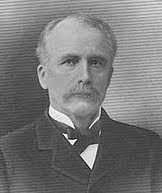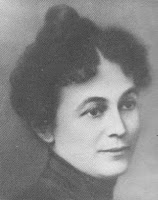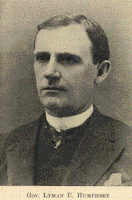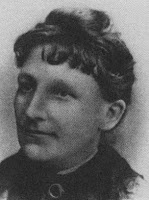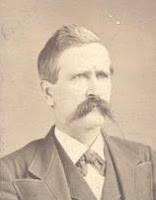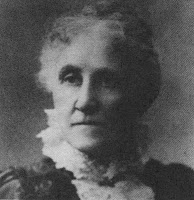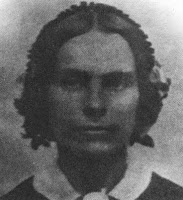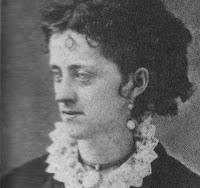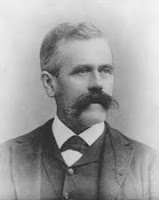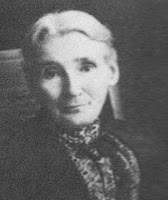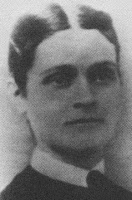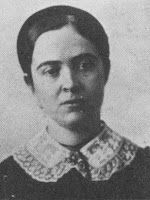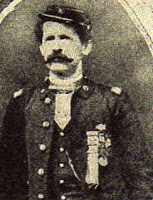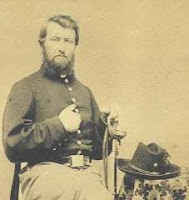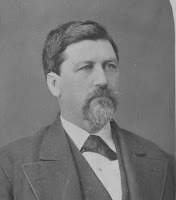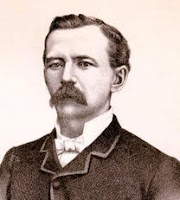
Gen. David Stewart Elliott.
Birth: Dec. 23, 1842, Chalybeate, Bedford County, Pennsylvania.
Death: Feb. 28, 1899, Caloocan City, Philippines.
Note. This page and photo was provided by: Gregory Speciale
Civil War Union Army Officer. David Stewart Elliott was born near the Chalybeate Springs, in Bedford township, on the 23d day of December, 1843. His early educational opportunities were exceedingly limited, being confined to a short attendance in the common schools; but a love of learning led to valiant and earnest efforts to overcome this deficiency by self-culture. At the age of thirteen the subject of this biography entered a store in Bedford as errand boy; but in less than a year his employer closed his business and young Elliott returned to farming, his former occupation. In September, 1858, he entered the office of the Bedford Gazette to learn the printer’s trade. Here he remained until April, 1861, when he enlisted for a term of three months in Capt. John H. Filler’s company (G) of the 13th regt. Penn. Vols.
At the expiration of his term of enlistment he re-enlisted for three years in Co. E, 76th regt. Penn. Vols., in which he served until near the close of the war. After his discharge from the service, Mr. Elliott accepted a position as compositor on the Bedford Inquirer, and during evenings and spare time applied himself closely to general reading and the study of the law. In September, 1868, he became part owner of the Bedford County Press, removed to Everett and assumed editorial charge of the paper. February 9, 1869, he was admitted to the bar of Bedford county. He continued as editor of the Press until 1873, when he resigned this position and devoted his time wholly to law business, soon establishing a large practice.
On the 1st of January, 1881, at the urgent request of the owners of the paper, he became the editor and chief manager of the Everett Press, which then changed its name from the Bedford County Press to the Everett Press. The paper under his able management has proved prosperous and popular, and has had an important influence in advancing the interests of the thriving town of Everett. Mr. Elliott began to take an active part in politics in 1868, and since that time has been prominent in the counsels of the republican party in Bedford county. Besides performing effective service as a stump speaker, he has acted as chairman of the republican county committee, and has been selected several times as a delegate to state conventions. In 1880 he was alternate delegate-at-large to the national convention at Chicago.
In 1874, and again in 1878, he was the almost unanimous choice of the republicans of Bedford county for state senator, but failed to receive the vote of the district conference, owing to local questions. Gen. Elliott has been prominently identified with military affairs. He was commissioned captain of Russell Zouaves, 16th division Penn. Militia, February 16, 1870; commissioned major-general 16th division, National Guard of Pennsylvania, January 16, 1873; commissioned lieutenant-colonel and division inspector, staff of Maj. Gen. James A. Beaver, September 9, 1875. Gen. Elliott has been prominently identified with various secret organizations, having been the commander of the first Grand Army Post established in Bedford county, besides holding almost every grade of office among the Odd-Fellows, in which order he is at present the grand marshal of the Grand Lodge of Pennsylvania.
He is also a Knight Templar Mason. He takes a deep interest in local affairs, particularly in schools, and is constantly called upon to accept positions of trust and responsibility. As a public speaker, editor and lawyer he has won a well-deserved and honorable reputation, while, as a citizen, his influence is felt in every work that tends to advance the best interests of the community. Gen. Elliott was married February 2, 1870, to Miss Rebecca A. Harris, eldest daughter of Josiah Harris, Esq., of Everett. She died in April, 1871. On the 28d day of December, 1874, he was again joined in marriage, the bride being Miss Clara J. Barndollar, daughter of Jacob Barndollar, Esq., of Everett. Four children have been born of this union: John Barndollar Elliott, Leila Cushwa Elliott, Clara Irene Elliott and James Russell Elliott. CAPT. DAVID STEWART ELLIOTT.
For more than half a century the name Elliott has been one of important associations with Kansas history. The quality of public service has distinguished the family in all generations. The first of the name in Kansas was a Pennsylvania soldier, also named David Stewart Elliott, who was killed by Quantrell's band of raiders during the Civil war. The late Capt. David Stewart Elliott of Coffeyville, long known as a lawyer, editor, fraternal organizer, and soldier, also gave up his life as a sacrifice to the country during the Philippine war. Several of the children of the late Captain Elliott are filling worthy places in their respective spheres, including his daughter, Miss Leila C. Elliott, who is now city treasurer of Coffeyville.
David Stewart Elliott, father of the late Captain Elliott, was born at Lewistown, Pennsylvania, was reared and educated and married in that state, and was an editor by profession. He served as a soldier in the Mexican war; and though quite an old man at the time he enlisted in 1861 in a Pennsylvania regiment of infantry. He was in the service in Kansas, and his company was on its way to Fort Smith to assist in repelling the Price invasion of Missouri and Kansas when he was killed by Quantrell's men at Baxter Springs. This was in 1864. He and others of the command were captured by the Quantrell raiders, were lined up against the wall and all shot.
This Pennsylvania soldier whose record deserves special mention in any history of Kansas had only one child, the late Capt. David Stewart Elliott. The mother of Captain Elliott was born at Everett, Pennsylvania, in 1822 and died at Coffeyville in 1892. At Everett, Pennsylvania, Capt. David Stewart Elliott was born December 23, 1843. When about fifteen years of age he entered a newspaper office to learn the printing trade and in April, 1861, enlisted in Company G of the Thirteenth Pennsylvania Volunteer Infantry. That was a three months' regiment, and at the end of his term he re-enlisted in Company E of the Seventy-sixth Pennsylvania Volunteers, and was with that command for more than three years. In 1868 he became editor of the Bedford County Press at Everett, Pennsylvania, and continued in that capacity until 1873.
On February 9, 1869, he was admitted to the bar of Bedford County, but after practicing a few years resumed his work as editor and was editor of the Everett Press from 1881 to 1885. In May, 1885, Captain Elliott became a member of the Montgomery County Bar, locating at Coffeyville, but soon answered the call to his old profession as a newspaper man and from June 5, 1885, to September 1, 1897, edited the Coffeyville Weekly Journal. Early in 1892 he established the Daily Journal, and was also its editor until 1897. In May, 1898, the Twentieth Kansas Regiment was enlisted for the Spanish-American war, and Company G was recruited at Independence, consisting for the most part of Montgomery County boys. The officers of the company were: D. Stewart Elliott, captain; H. A. Scott of Sycamore, first lieutenant; and William A. McTaggart, son of Senator McTaggart, second lieutenant. As every Kansan knows, the Twentieth Kansas made its record of achievement in the Philippines. Captain Elliott, whose qualifications as a military leader were enhanced by his previous service in the Civil war, went with the regiment to the Philippines early in 1899, and while in line of duty at Calocan, just north of Manila, on February 28, 1899, was shot by a Filipino sharpshooter and died a few hours later.
His remains were brought home and on April 14, 1899, were laid to rest at Coffeyville with military honors. He had entered the Civil war at the age of seventeen, and he was in his fifty-sixth year when death came to him in the Far East. Something of Captain Elliott's talents and characteristics can be learned by a brief quotation from an old history of Montgomery County: "After locating in the county Captain Elliott devoted only a portion of his time to the practice of law. His tastes led to the formation of his fellow men into associations, political parties and other organizations, and the promulgation and advocacy of their principles, rather than to the irksome and methodical work demanded in the practice of law. For this work of his choice he was by nature admirably equipped.
He was a fluent and pleasant speaker and at once took a leading part in meetings to effect such organizations, or to advocate their tenets. As a writer he was terse, graceful and effective, and as a soldier enthusiastic and courageous. During his residence in Coffeyville Captain Elliott was its attorney for one or more terms and a member one term of the lower house of the Kansas Legislature, where he was at once a conspicuous member. At his death he was a member of sixteen lodges." Captain Elliott was a republican, and was filling the office of city clerk at Coffeyville at the time he resigned to enlist for service in the Spanish-American war. As an active member of the Methodist Episcopal Church he served as president of the Epworth League and superintendent of the Sunday school, and held all the lay offices in the church.
Among the fraternities of which he was an influential member were the following: Keystone Lodge No. 102, Ancient Free and Accepted Masons; Coffeyville Chapter No. 89, Royal Arch Masons; St. Bernard's Commandery No. 10, Knight Templars, at Independence; with the Scottish Rite bodies of Masonry; Coffeyville Lodge of the Independent Order of Odd Fellows; Camp No. 665, Modern Woodmen of America; Woodmen of the World; Select Friends; Knights and Ladies of Security; Knights of Pythias; Lodge No. 279, Ancient Order of United Workmen; Post No. 90, Grand Army of the Republic; also the organization of Sons of Veterans.
Captain Elliott married Miss Clara Barndollar, who is still living at Coffeyville with her children. She was born at Everett, Bedford County, Pennsylvania, September 24, 1846, and represents an old American family. One of her ancestors was John Williams, who served as a private under Capt. David Hendershot in the First Battalion of Bedford County during the Revolutionary war. Another of her revolutionary ancestors was Capt. Richard Dunlap, who was captain of the Bedford Company in the First Battalion of Militia commanded by Col. William Parker, Captain Dunlap was killed while fighting at Frankstown, Pennsylvania, on June 3, 1781. Another ancestral connection of interest was Capt. James Martin. He married Sarah Thomas, the great-grandmother of Mrs. Captain Elliott, and they were married at the home of Benjamin Franklin on October 19, 1759.
Captain Martin was a first lieutenant and afterwards promoted to captain of a company from Pennsylvania in the Revolution. A brief record of the children of the late Capt. David S. Elliott and wife is as follows: John B., who was a member of his father's company and who is now superintendent of the Pullman Company at Kansas City, Missouri; Miss Leila C.; Irene, who lives at Coffeyville with her mother; James Russell, who enlisted in his father's company at the age of fifteen, and was the youngest soldier in the American army during the Spanish-American war; Grace, at home with her mother; and David S., Jr., who was educated at Baker University and is the republican nominee for county clerk of Montgomery County. Miss Leila C. Elliott, now city treasurer of Coffeyville, was born at Everett, Pennsylvania, but was reared and educated at Coffeyville. She possesses unusual business ability and efficiency in the routine and detail management of public offices, and for a time was deputy city clerk and afterwards was elected and served as city clerk for three years. In 1913 she became city treasurer, and is giving a most excellent administration of that important office. Miss Elliott is a member of the Daughters of the American Revolution, and is active in the Methodist Episcopal Church.
Birth: Dec. 23, 1842, Chalybeate, Bedford County, Pennsylvania.
Death: Feb. 28, 1899, Caloocan City, Philippines.
Note. This page and photo was provided by: Gregory Speciale
Civil War Union Army Officer. David Stewart Elliott was born near the Chalybeate Springs, in Bedford township, on the 23d day of December, 1843. His early educational opportunities were exceedingly limited, being confined to a short attendance in the common schools; but a love of learning led to valiant and earnest efforts to overcome this deficiency by self-culture. At the age of thirteen the subject of this biography entered a store in Bedford as errand boy; but in less than a year his employer closed his business and young Elliott returned to farming, his former occupation. In September, 1858, he entered the office of the Bedford Gazette to learn the printer’s trade. Here he remained until April, 1861, when he enlisted for a term of three months in Capt. John H. Filler’s company (G) of the 13th regt. Penn. Vols.
At the expiration of his term of enlistment he re-enlisted for three years in Co. E, 76th regt. Penn. Vols., in which he served until near the close of the war. After his discharge from the service, Mr. Elliott accepted a position as compositor on the Bedford Inquirer, and during evenings and spare time applied himself closely to general reading and the study of the law. In September, 1868, he became part owner of the Bedford County Press, removed to Everett and assumed editorial charge of the paper. February 9, 1869, he was admitted to the bar of Bedford county. He continued as editor of the Press until 1873, when he resigned this position and devoted his time wholly to law business, soon establishing a large practice.
On the 1st of January, 1881, at the urgent request of the owners of the paper, he became the editor and chief manager of the Everett Press, which then changed its name from the Bedford County Press to the Everett Press. The paper under his able management has proved prosperous and popular, and has had an important influence in advancing the interests of the thriving town of Everett. Mr. Elliott began to take an active part in politics in 1868, and since that time has been prominent in the counsels of the republican party in Bedford county. Besides performing effective service as a stump speaker, he has acted as chairman of the republican county committee, and has been selected several times as a delegate to state conventions. In 1880 he was alternate delegate-at-large to the national convention at Chicago.
In 1874, and again in 1878, he was the almost unanimous choice of the republicans of Bedford county for state senator, but failed to receive the vote of the district conference, owing to local questions. Gen. Elliott has been prominently identified with military affairs. He was commissioned captain of Russell Zouaves, 16th division Penn. Militia, February 16, 1870; commissioned major-general 16th division, National Guard of Pennsylvania, January 16, 1873; commissioned lieutenant-colonel and division inspector, staff of Maj. Gen. James A. Beaver, September 9, 1875. Gen. Elliott has been prominently identified with various secret organizations, having been the commander of the first Grand Army Post established in Bedford county, besides holding almost every grade of office among the Odd-Fellows, in which order he is at present the grand marshal of the Grand Lodge of Pennsylvania.
He is also a Knight Templar Mason. He takes a deep interest in local affairs, particularly in schools, and is constantly called upon to accept positions of trust and responsibility. As a public speaker, editor and lawyer he has won a well-deserved and honorable reputation, while, as a citizen, his influence is felt in every work that tends to advance the best interests of the community. Gen. Elliott was married February 2, 1870, to Miss Rebecca A. Harris, eldest daughter of Josiah Harris, Esq., of Everett. She died in April, 1871. On the 28d day of December, 1874, he was again joined in marriage, the bride being Miss Clara J. Barndollar, daughter of Jacob Barndollar, Esq., of Everett. Four children have been born of this union: John Barndollar Elliott, Leila Cushwa Elliott, Clara Irene Elliott and James Russell Elliott. CAPT. DAVID STEWART ELLIOTT.
For more than half a century the name Elliott has been one of important associations with Kansas history. The quality of public service has distinguished the family in all generations. The first of the name in Kansas was a Pennsylvania soldier, also named David Stewart Elliott, who was killed by Quantrell's band of raiders during the Civil war. The late Capt. David Stewart Elliott of Coffeyville, long known as a lawyer, editor, fraternal organizer, and soldier, also gave up his life as a sacrifice to the country during the Philippine war. Several of the children of the late Captain Elliott are filling worthy places in their respective spheres, including his daughter, Miss Leila C. Elliott, who is now city treasurer of Coffeyville.
David Stewart Elliott, father of the late Captain Elliott, was born at Lewistown, Pennsylvania, was reared and educated and married in that state, and was an editor by profession. He served as a soldier in the Mexican war; and though quite an old man at the time he enlisted in 1861 in a Pennsylvania regiment of infantry. He was in the service in Kansas, and his company was on its way to Fort Smith to assist in repelling the Price invasion of Missouri and Kansas when he was killed by Quantrell's men at Baxter Springs. This was in 1864. He and others of the command were captured by the Quantrell raiders, were lined up against the wall and all shot.
This Pennsylvania soldier whose record deserves special mention in any history of Kansas had only one child, the late Capt. David Stewart Elliott. The mother of Captain Elliott was born at Everett, Pennsylvania, in 1822 and died at Coffeyville in 1892. At Everett, Pennsylvania, Capt. David Stewart Elliott was born December 23, 1843. When about fifteen years of age he entered a newspaper office to learn the printing trade and in April, 1861, enlisted in Company G of the Thirteenth Pennsylvania Volunteer Infantry. That was a three months' regiment, and at the end of his term he re-enlisted in Company E of the Seventy-sixth Pennsylvania Volunteers, and was with that command for more than three years. In 1868 he became editor of the Bedford County Press at Everett, Pennsylvania, and continued in that capacity until 1873.
On February 9, 1869, he was admitted to the bar of Bedford County, but after practicing a few years resumed his work as editor and was editor of the Everett Press from 1881 to 1885. In May, 1885, Captain Elliott became a member of the Montgomery County Bar, locating at Coffeyville, but soon answered the call to his old profession as a newspaper man and from June 5, 1885, to September 1, 1897, edited the Coffeyville Weekly Journal. Early in 1892 he established the Daily Journal, and was also its editor until 1897. In May, 1898, the Twentieth Kansas Regiment was enlisted for the Spanish-American war, and Company G was recruited at Independence, consisting for the most part of Montgomery County boys. The officers of the company were: D. Stewart Elliott, captain; H. A. Scott of Sycamore, first lieutenant; and William A. McTaggart, son of Senator McTaggart, second lieutenant. As every Kansan knows, the Twentieth Kansas made its record of achievement in the Philippines. Captain Elliott, whose qualifications as a military leader were enhanced by his previous service in the Civil war, went with the regiment to the Philippines early in 1899, and while in line of duty at Calocan, just north of Manila, on February 28, 1899, was shot by a Filipino sharpshooter and died a few hours later.
His remains were brought home and on April 14, 1899, were laid to rest at Coffeyville with military honors. He had entered the Civil war at the age of seventeen, and he was in his fifty-sixth year when death came to him in the Far East. Something of Captain Elliott's talents and characteristics can be learned by a brief quotation from an old history of Montgomery County: "After locating in the county Captain Elliott devoted only a portion of his time to the practice of law. His tastes led to the formation of his fellow men into associations, political parties and other organizations, and the promulgation and advocacy of their principles, rather than to the irksome and methodical work demanded in the practice of law. For this work of his choice he was by nature admirably equipped.
He was a fluent and pleasant speaker and at once took a leading part in meetings to effect such organizations, or to advocate their tenets. As a writer he was terse, graceful and effective, and as a soldier enthusiastic and courageous. During his residence in Coffeyville Captain Elliott was its attorney for one or more terms and a member one term of the lower house of the Kansas Legislature, where he was at once a conspicuous member. At his death he was a member of sixteen lodges." Captain Elliott was a republican, and was filling the office of city clerk at Coffeyville at the time he resigned to enlist for service in the Spanish-American war. As an active member of the Methodist Episcopal Church he served as president of the Epworth League and superintendent of the Sunday school, and held all the lay offices in the church.
Among the fraternities of which he was an influential member were the following: Keystone Lodge No. 102, Ancient Free and Accepted Masons; Coffeyville Chapter No. 89, Royal Arch Masons; St. Bernard's Commandery No. 10, Knight Templars, at Independence; with the Scottish Rite bodies of Masonry; Coffeyville Lodge of the Independent Order of Odd Fellows; Camp No. 665, Modern Woodmen of America; Woodmen of the World; Select Friends; Knights and Ladies of Security; Knights of Pythias; Lodge No. 279, Ancient Order of United Workmen; Post No. 90, Grand Army of the Republic; also the organization of Sons of Veterans.
Captain Elliott married Miss Clara Barndollar, who is still living at Coffeyville with her children. She was born at Everett, Bedford County, Pennsylvania, September 24, 1846, and represents an old American family. One of her ancestors was John Williams, who served as a private under Capt. David Hendershot in the First Battalion of Bedford County during the Revolutionary war. Another of her revolutionary ancestors was Capt. Richard Dunlap, who was captain of the Bedford Company in the First Battalion of Militia commanded by Col. William Parker, Captain Dunlap was killed while fighting at Frankstown, Pennsylvania, on June 3, 1781. Another ancestral connection of interest was Capt. James Martin. He married Sarah Thomas, the great-grandmother of Mrs. Captain Elliott, and they were married at the home of Benjamin Franklin on October 19, 1759.
Captain Martin was a first lieutenant and afterwards promoted to captain of a company from Pennsylvania in the Revolution. A brief record of the children of the late Capt. David S. Elliott and wife is as follows: John B., who was a member of his father's company and who is now superintendent of the Pullman Company at Kansas City, Missouri; Miss Leila C.; Irene, who lives at Coffeyville with her mother; James Russell, who enlisted in his father's company at the age of fifteen, and was the youngest soldier in the American army during the Spanish-American war; Grace, at home with her mother; and David S., Jr., who was educated at Baker University and is the republican nominee for county clerk of Montgomery County. Miss Leila C. Elliott, now city treasurer of Coffeyville, was born at Everett, Pennsylvania, but was reared and educated at Coffeyville. She possesses unusual business ability and efficiency in the routine and detail management of public offices, and for a time was deputy city clerk and afterwards was elected and served as city clerk for three years. In 1913 she became city treasurer, and is giving a most excellent administration of that important office. Miss Elliott is a member of the Daughters of the American Revolution, and is active in the Methodist Episcopal Church.
